In this article:
Oily skin is a common skin concern that arises from various factors such as genetics, hormonal fluctuations, diet, and environmental influences.
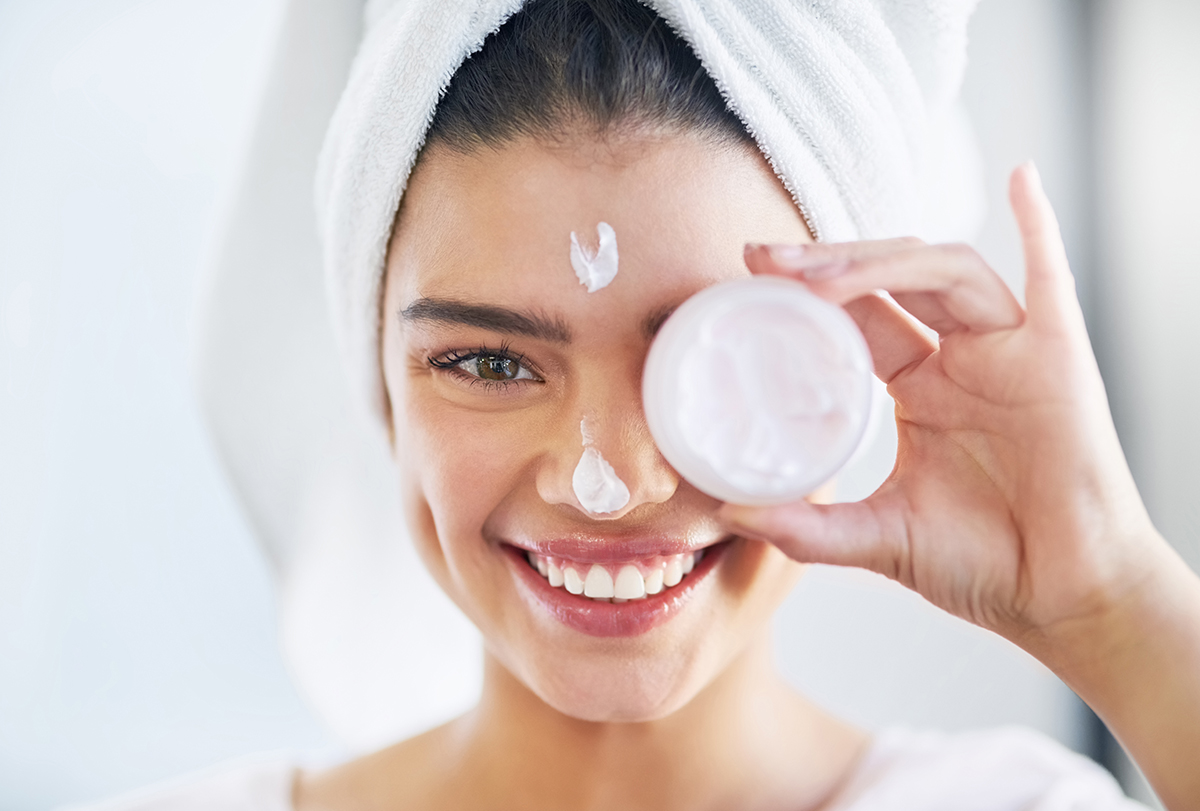
Excessive sebum production is a hallmark of oily skin, often leading to issues such as clogged pores, acne breakouts, and an overall shiny appearance. (1)(2)
According to the American Academy of Dermatology Association, contrary to popular belief, moisturizing is crucial even for oily skin types, as it helps maintain a healthy skin barrier and prevents dehydration. (3) However, choosing the right kind of moisturizer is key.
This article will explore the different types of moisturizers specifically designed for oily skin to help you find the best options to balance the moisture levels of your skin, control skin oiliness, and promote a clear and radiant complexion.
Moisturizers for Oily Skin
When selecting a lotion or moisturizer, it’s important to choose a high-quality product that is specifically formulated for your skin type.
Here are some moisturizers for oily skin.
1. Retinoid-containing moisturizer
Isotretinoin, a type of retinoid, is a medication that is primarily used to treat severe cases of acne.
Its pharmacological profile suggests that it works by reducing the size of the sebaceous glands and decreasing sebum production, in turn altering the composition of the skin’s surface lipids. This reduction in sebum production helps to prevent the formation of acne lesions.
In addition to its effects on sebum production, isotretinoin also appears to reduce the population of bacterial skin microflora. This is likely due to the altered sebaceous factors resulting from reduced sebum production, which can create a less favorable environment for bacterial growth. (4)
2. Hyaluronic acid-containing moisturizer
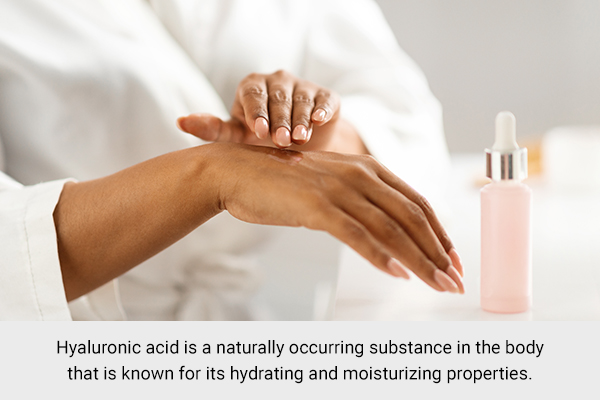
Hyaluronic acid is a naturally occurring substance in the body that is known for its hydrating and moisturizing properties. Experts claim it is great for all skin types, including oily skin, because it helps to regulate sebum production and keep the skin hydrated.
Hyaluronic acid can help to regulate sebum production as research has found it to decrease sebum production and provide hydration to the skin without adding excess oil or clogging pores. According to one study, it is an effective candidate in the management of oiliness in which sebum production is increased. (5)
When applied topically, hyaluronic acid acts as a humectant, drawing moisture from the environment and binding it to the skin. This helps to keep the skin hydrated and plump, reducing the appearance of fine lines and wrinkles.
Additionally, professionals explain that hyaluronic acid is noncomedogenic, meaning it won’t clog pores or cause breakouts, making it an ideal ingredient for oily skin types. (5)
3. Kaolin-containing moisturizer
Oil-absorbent compounds such as kaolin are often added to moisturizers for people with oily skin to help reduce the appearance of excess shine. Kaolin, also known as white clay, is a naturally occurring mineral that is known for its ability to absorb excess oil and impurities from the skin.
When added to moisturizers, kaolin helps to control oil production on the skin’s surface, preventing it from looking shiny or greasy. It also helps to unclog pores and remove impurities, which can be particularly beneficial for people with acne-prone skin. (6)
4. Salicylic acid-containing moisturizer
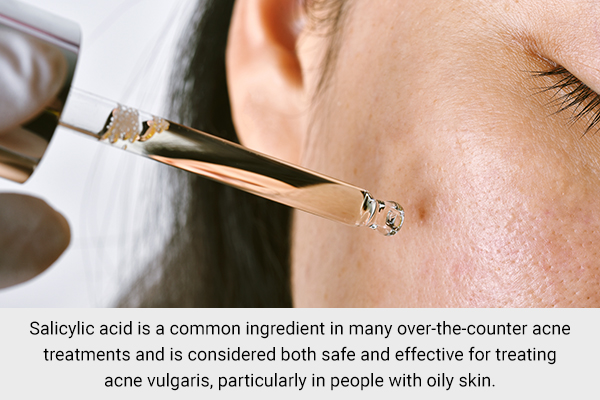
Salicylic acid is a common ingredient in many over-the-counter acne treatments and is considered both safe and effective for treating acne vulgaris, particularly in people with oily skin.
Salicylic acid is a beta-hydroxy acid that works by penetrating the pores and exfoliating the skin, which can help to unclog pores and prevent acne breakouts. It also has anti-inflammatory properties that can help to reduce redness and inflammation associated with acne.
For people with oily skin, salicylic acid can be particularly beneficial as it can help to control oil production on the skin’s surface. By exfoliating the skin and keeping the pores clear, it can also help to prevent the buildup of excess oil and bacteria that can lead to acne. (7)(8)
5. Niacinamide-containing moisturizer
Topical niacinamide has been studied for its potential benefits in managing oily skin. One study found that using a topical 2% niacinamide formulation significantly reduced sebum excretion rates in the study participants after 2 and 4 weeks of use.
Niacinamide, also known as vitamin B3, has a range of skin benefits, including improving the skin barrier function and reducing inflammation. It is also believed to have a regulating effect on sebum production, making it a promising ingredient for people with oily or acne-prone skin.
Topical niacinamide is generally considered safe for most skin types, including those with sensitive skin. It can be found in a variety of skin care products, such as moisturizers, serums, and sunscreens. (2)(9)
6. L-carnitine-containing moisturizer
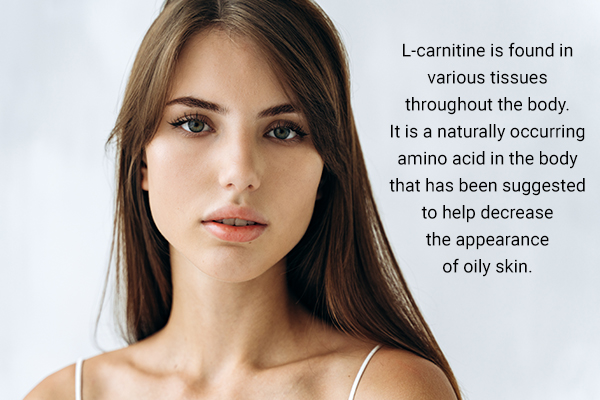
L-carnitine is found in various tissues throughout the body. It is a naturally occurring amino acid in the body that has been suggested to help decrease the appearance of oily skin. It works by increasing the breakdown of fatty acids in a process called β-oxidation.
A study has shown that applying a topical 2% L-carnitine significantly reduced the intracellular fatty acid content in human sebocytes, resulting in a significant reduction in sebum production.
While the research on the use of L-carnitine for oily skin is promising, more studies are needed to fully understand its effectiveness and potential side effects. (2)
7. Dimethicone-containing moisturizer
Silicones are a class of synthetic materials that are commonly used in cosmetic and personal care products. They are often used in products that are labeled as “oil-free” because they have a unique chemical structure that allows them to provide many of the same benefits as those of oils without being greasy or heavy on the skin.
Dimethicone is a commonly used silicone ingredient in cosmetic products. It has moisturizing and softening effects on the skin and is used in moisturizers such as creams and lotions.
It is considered to be hypoallergenic, noncomedogenic, and non-acnegenic, which means it is unlikely to cause allergic reactions, clog pores, or exacerbate acne. (10)
Note: Although toxicity due to topical application of silicone components has not been reported so far, experts recommend using herbal moisturizers over silicone ones.
Some beneficial herbal moisturizers are as follows.
8. Green tea-containing moisturizer
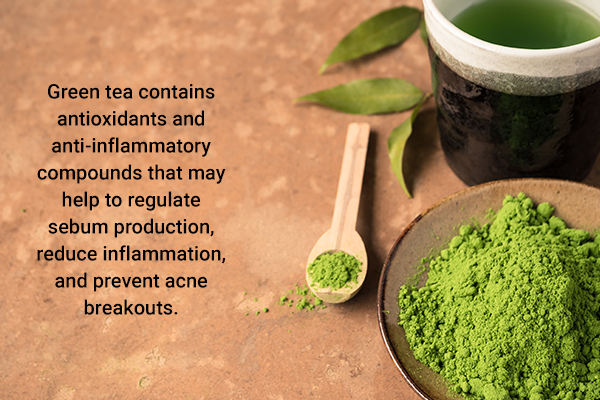
Green tea has been studied for its potential benefits in managing oily skin.
One small study found that applying a 3% green tea emulsion for 8 weeks resulted in a significant reduction in sebum production in the study participants compared to the baseline. (2)
Another slightly larger study also found a significant reduction in sebum secretion after 60 days of using a topical green tea emulsion. (11)
Green tea contains antioxidants and anti-inflammatory compounds that may help to regulate sebum production, reduce inflammation, and prevent acne breakouts. They are believed to work by reducing the activity of certain enzymes that contribute to the production of sebum.
Topical cosmetics containing green tea may be beneficial for those with oily skin. They can be found in a variety of skin care products, including moisturizers, serums, and facial masks.
9. Turmeric-containing moisturizer
A study showed that a turmeric extract cream can help control excessive sebum secretion in people with oily skin. The cream containing 5% turmeric extract reduced sebum secretion by up to 24.8% after 4 weeks of use.
This study result suggested that using a moisturizer with turmeric may be beneficial for oily skin, especially for those dealing with acne and related issues. (12)
10. Witch hazel-containing moisturizer
Witch hazel is a natural ingredient often used in skin care products for oily skin. It acts as an astringent, helping to tighten pores and control excess oil.
Witch hazel ointments, such as those used for acne, contain high tannin levels that provide this astringent effect.
So, using moisturizers containing witch hazel can be beneficial for managing oily skin and acne. (13)
Dealing with Oily Skin
A number of treatment options are available for oily skin, depending on the severity of the condition and the individual’s needs.
Here are some possible options, as suggested by researchers and the American Academy of Dermatology Association: (1)(2)
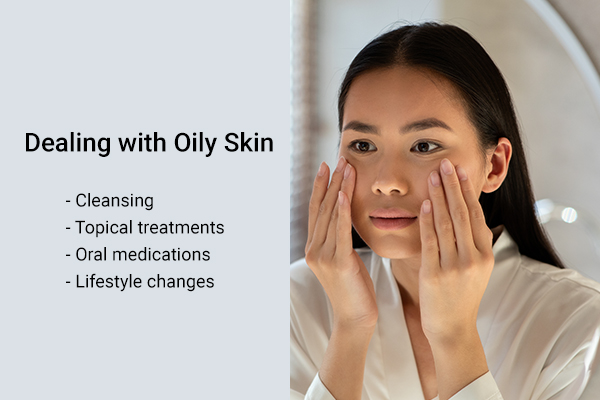
- Cleansing: One of the simplest and most effective ways to treat oily skin is to cleanse it regularly with a gentle, oil-free cleanser. This can help remove excess oil and impurities from the skin.
- Topical treatments: Several topical treatments are available for oily skin, including retinoids, benzoyl peroxide, and salicylic acid. These treatments can help to unclog pores, reduce inflammation, and control sebum production.
- Oral medications: In some cases, oral medications may be necessary to treat severe cases of oily skin or acne. These can include antibiotics.
- Lifestyle changes: Making certain lifestyle changes can also help to improve oily skin. For example, maintaining a healthy diet, staying hydrated, getting enough sleep, and avoiding smoking can all help to improve the overall health of your skin.
It’s important to consult a dermatologist to determine the best treatment options for your individual needs, as every person’s skin is unique and may require a personalized approach to treatment.
When to See a Doctor
It is important to talk to a dermatologist or healthcare provider before adding any new skin care product to your routine, especially if you have sensitive skin or are prone to allergies.
As with any skin care ingredient, it’s important to do a patch test before use and to talk to a dermatologist or healthcare provider if you have any concerns or experience any adverse effects.
Most-Asked Questions
Can I use scrubs to wash my oily skin?
The American Academy of Dermatology Association states that scrubbing your skin while washing, even to remove makeup, can irritate it and worsen its condition. So, resist the temptation to scrub and be gentle with your skin.
What does noncomedogenic on the product label mean?
The term “noncomedogenic” refers to products that have been formulated and tested not to clog pores or cause acne. These products, including cleansers, moisturizers, and makeup, are designed to be gentle on the skin and are suitable for people with oily or acne-prone skin.
Using non comedogenic products can help to prevent breakouts and keep your skin healthy and clear. It is important to look for this label when selecting skin care and cosmetic products if you have oily or acne-prone skin.
Final Word
Daily moisturizing is a crucial part of maintaining healthy skin even if it’s oily. Your skin is the body’s largest organ and serves as a protective barrier against environmental factors.
Proper moisturizing can help keep the skin hydrated, prevent dryness and flakiness, improve its elasticity and texture, and reduce the appearance of fine lines and wrinkles. Neglecting daily moisturizing can lead to dull, dry, and irritated skin.
- Was this article helpful?
- YES, THANKS!NOT REALLY


